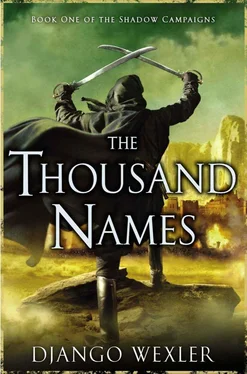Django Wexler - The Thousand Names
Здесь есть возможность читать онлайн «Django Wexler - The Thousand Names» весь текст электронной книги совершенно бесплатно (целиком полную версию без сокращений). В некоторых случаях можно слушать аудио, скачать через торрент в формате fb2 и присутствует краткое содержание. Жанр: Фэнтези, на английском языке. Описание произведения, (предисловие) а так же отзывы посетителей доступны на портале библиотеки ЛибКат.
- Название:The Thousand Names
- Автор:
- Жанр:
- Год:неизвестен
- ISBN:нет данных
- Рейтинг книги:4 / 5. Голосов: 1
-
Избранное:Добавить в избранное
- Отзывы:
-
Ваша оценка:
- 80
- 1
- 2
- 3
- 4
- 5
The Thousand Names: краткое содержание, описание и аннотация
Предлагаем к чтению аннотацию, описание, краткое содержание или предисловие (зависит от того, что написал сам автор книги «The Thousand Names»). Если вы не нашли необходимую информацию о книге — напишите в комментариях, мы постараемся отыскать её.
The Thousand Names — читать онлайн бесплатно полную книгу (весь текст) целиком
Ниже представлен текст книги, разбитый по страницам. Система сохранения места последней прочитанной страницы, позволяет с удобством читать онлайн бесплатно книгу «The Thousand Names», без необходимости каждый раз заново искать на чём Вы остановились. Поставьте закладку, и сможете в любой момент перейти на страницу, на которой закончили чтение.
Интервал:
Закладка:
After that, they got back on the subject of Lieutenant d’Vries, and Winter took the opportunity to excuse herself. She tapped Bobby on the shoulder as she stood, and the boy looked up at her.
“Can I have a word?” Winter said.
They walked away from the little circle. The sun had gone down and the sky was darkening fast, already purple-gray. Winter stared upward pensively, where the stars were beginning to glitter. To someone raised in the smoky, torch-lit warrens of Vordan City, the nights of Khandar had been a revelation. Instead of the occasional twinkle, the stars marched across the sky in their uncounted thousands, and when the moon rose it seemed clear enough that she could reach out and touch it.
It had been a long time since she’d noticed the night sky like that. But it occurred to her that Bobby and the other recruits would only just have seen it for the first time. She wondered if any of them had spent a night staring up slack-jawed in wonder, as she had.
She wanted to thank the corporal for dragging her out of her tent, but she couldn’t think of a way to begin. When she glanced at Bobby’s face, shadowed as it was in the fading light, it was clear that the boy understood. Winter gave a grateful sigh.
“I had an idea,” she said, “while we were talking. It might get us into trouble, though.”
“Let’s hear it,” Bobby said cheerfully.
“The key is going to be timing.” Winter chewed her lip thoughtfully. “We’ll need to spread the word tonight, so we can get everyone rounded up quick once the march ends tomorrow. .”
• • •
“Load!”
Winter had dispensed with the drumbeat that the regulations prescribed. It was essential for drillbook perfection that every soldier perform the twenty-six numbered movements from the Manual of Arms in unison, synchronized to the beat of the drum, but in practice she found that it only confused the men. Instead she walked up and down in front of the triple line, letting her footsteps serve as cadence.
The rankers, already grimed with sweat, struggled with their weapons. Winter sympathized. Loading was a complicated process. First you took your paper cartridge, filled with premeasured powder and the lead musket ball, and tore it in half with your teeth, holding the ball end in your mouth and keeping the end with the powder in your hand. Then you opened the lock, tipped a little powder into the pan, and closed it again. The rest of the powder went down the barrel, which required you to ground the butt of the weapon and hold it against your boot. The cartridge scraps went in with it, for good luck. Finally, you spat the musket ball and the rest of the cartridge into the barrel, grabbed the iron ramrod from the rings that held it slung under the weapon, and jammed the whole mess home with two or three good strokes.
There wasn’t enough extra powder to practice loading, so the company was going through the steps in mime. Once the ramrods had rattled back into their rings, each man again brought his musket to the ready position, held at his side with the left hand curled around the butt. Some took longer than others. Winter, counting heartbeats, estimated it was half a minute or more before the whole company was ready. She clicked her tongue.
“Level!” she shouted, walking aside to clear the theoretical line of fire. Every man raised his musket to his shoulder and pulled back the hammer. Here and there she heard a quiet curse as someone fumbled the maneuver or a musket barrel whacked against the side of a neighbor’s head. Only the front two ranks readied their weapons, while the third waited. The barrels protruded like bristles on a porcupine, all along the company line.
Winter waited a few more heartbeats, then raised her voice again. “Fire!”
Eighty fingers tightened on triggers. On each weapon, the lock slid open and the flint snapped down, raising sparks where it scraped against the steel. Without powder, there was no sound but the rapid series of clicks. Winter strode back in front of them.
“Load!” And they began again.
They’d been at it for an hour already. The march had ended at noon, and with Winter’s encouragement the Seventh Company had hurried through the business of setting up tents and making camp and then rushed out to the drill field well before Lieutenant d’Vries had arrived. They’d been the first ones there. Winter had gone over what she expected of them, some basics from the Manual of Arms and a few things that weren’t in the drillbook at all. If they were going to have to drill, it might as well be useful drill.
Some of the men groaned when she’d explained her approach, but she saw relief on a great many faces. Bobby had said some of them hadn’t even made it to the depot before they’d been summoned up, and others had had only a few days or weeks of what was supposed to be a month and half of basic training. Even the grumblers had to admit it made a nice change from endless failures at esoteric skills like double-pace oblique marching.
Midway through the loading, while they were fumbling with their rammers, Winter turned to face them and shouted, “Square!”
This had been new to even those who had had their full time in depot, since the drillbook never mentioned company squares, but she’d coached them through it and they’d gotten the idea after a few repetitions. The whole company immediately broke off loading, and the edges of the line-ten files from either side-about-faced and stepped toward the rear. They filed in behind the first three ranks, so that the line had been halved in length and doubled in width.
Once they were in place, each man drew his bayonet from its leather sheath. These blades, ten inches of wickedly pointed steel, locked onto a lug beside the barrel of the musket with a twist, converting the weapon into something approximating a spear. This done, the first rank knelt, and the second rank leveled their muskets over the heads of the first at an angle. The three files on the edges of the line turned through ninety degrees to face outward instead of forward and back.
It was smartly done, at least this time. The result wasn’t a proper square-more of a rectangle, Winter noted pedantically-but it was easy to form, and the hedgehog of gleaming bayonets looked like a formidable obstacle. The third rank kept at their loading, awkwardly now as they tried to avoid cutting themselves on their own bayonets, and when they had finished they leveled their weapons. The hope was that the combination of fire and steel would prove an impregnable barrier to enemy cavalry.
Winter let them hold it for a few moments, then called, “Re-form!” The square melted back into a line, with considerably more confusion and disorder than it had shown going the other way. She made a mental note to work through that a few more times.
By now the drill field was filling up, and Winter’s men had gotten a few curious looks from other officers. She’d ignored them, reserving her attention for her men, but she’d positioned them so that she’d have a good view of the path back to camp. When she saw Lieutenant d’Vries approaching, with his powdered hair and his walking stick, she stopped and leaned close to Bobby.
“Take them up to the end of the field and back, would you?” Winter said. “I’ll have a word with the lieutenant.”
“Right,” the corporal said, practically glowing with the joy of responsibility. He stepped out of the ranks and gestured to the drummers, who had been squatting in the dirt, unneeded until now. “Company, guide center, ordinary pace, forward march !”
The drums took up the funeral thump of the standard walking pace, and the Seventh Company set off in reasonably good order. Winter remained behind, waiting at attention for d’Vries. The young officer watched bemusedly as his soldiers marched away, then gave Winter his full attention.
Читать дальшеИнтервал:
Закладка:
Похожие книги на «The Thousand Names»
Представляем Вашему вниманию похожие книги на «The Thousand Names» списком для выбора. Мы отобрали схожую по названию и смыслу литературу в надежде предоставить читателям больше вариантов отыскать новые, интересные, ещё непрочитанные произведения.
Обсуждение, отзывы о книге «The Thousand Names» и просто собственные мнения читателей. Оставьте ваши комментарии, напишите, что Вы думаете о произведении, его смысле или главных героях. Укажите что конкретно понравилось, а что нет, и почему Вы так считаете.











